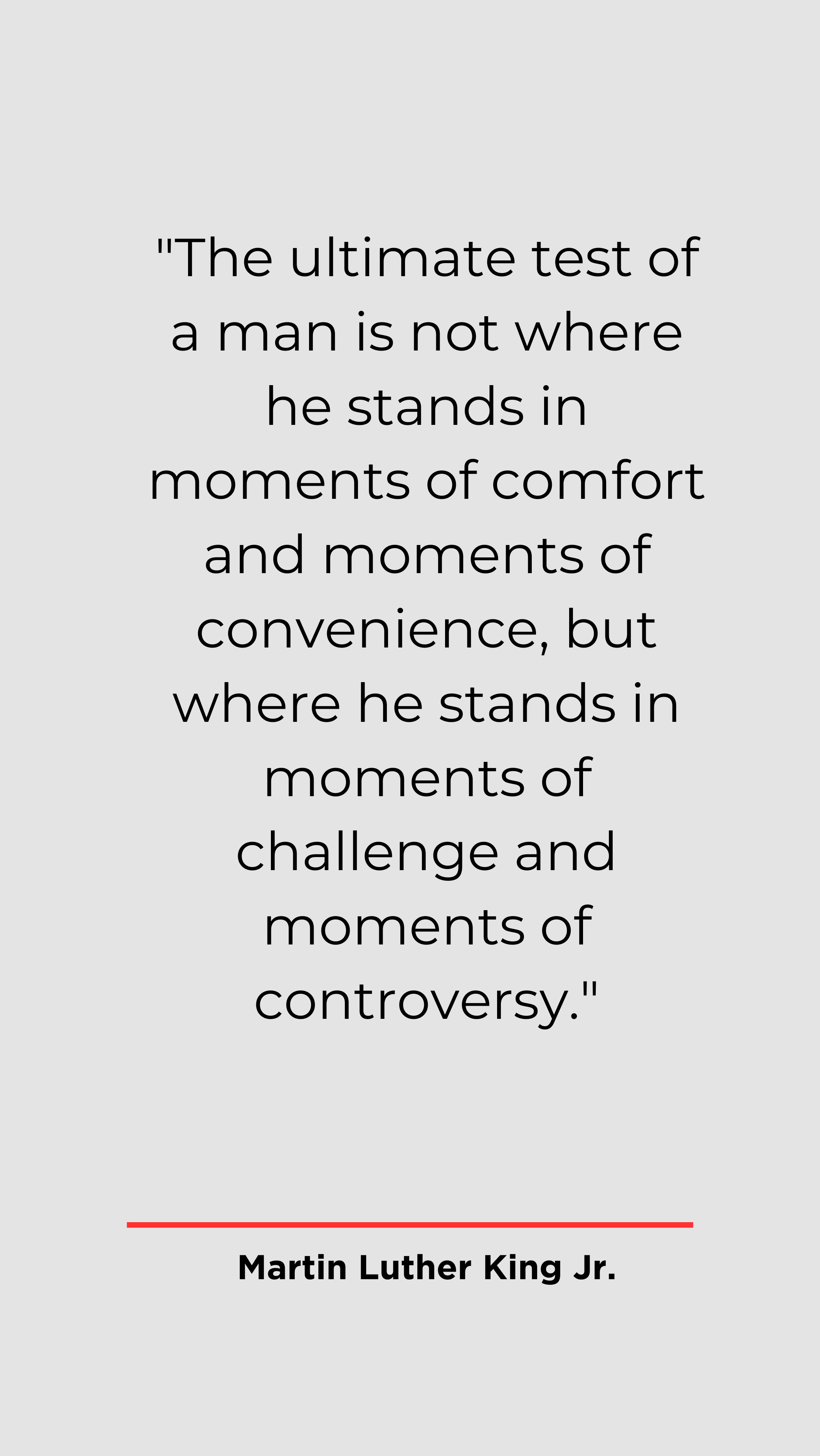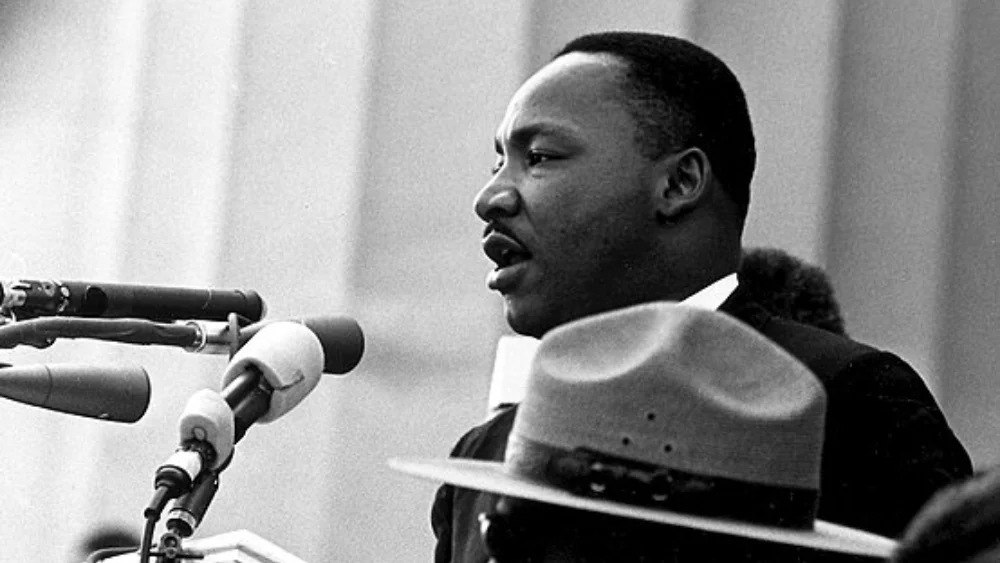Martin Luther King, Jr., born on January 15, 1929, in Atlanta, Georgia, was a Baptist minister and a prominent leader in the American Civil Rights Movement. He dedicated his life to fighting against racial segregation and promoting equality for African Americans. King’s speeches and nonviolent activism left an enduring legacy, bringing significant changes in the U.S. civil rights struggle.
Early Life and Education
King’s early life and education profoundly shaped him into the influential civil rights leader he would become. Born in Atlanta, Georgia, King witnessed racial discrimination’s injustices while growing up in the deeply segregated South. His father’s preaching and mother’s teaching nurtured faith, education, and social responsibility values, thereby shaping him profoundly.
King’s academic excellence was evident from the beginning, and he began attending Morehouse College at the remarkable age of 15. At Morehouse, he embraced Gandhi’s nonviolent resistance, which strongly resonated, shaping his philosophies and actions. These teachings molded his activism, a central pillar in pursuing civil rights and social justice. Early discrimination and nonviolence principles shaped King’s leadership, making him a beacon of hope and inspiration for future generations.
Martin Luther King Jr.: Montgomery Bus Boycott and Rise to Prominence
Montgomery Bus Boycott, led by King after Parks’ defiance, was pivotal in the Civil Rights Movement. The year-long boycott showcased the African American community’s strength and resolve against racial segregation and injustice, displaying collective determination. King’s leadership demonstrated nonviolent commitment, rallying and motivating masses for equality and justice during this historic event.
King led the Montgomery Bus Boycott to success, culminating in a Supreme Court ruling against racial segregation on public buses. This triumph not only marked a victory for civil rights but also catapulted Martin Luther King, Jr. to national prominence. Eloquent, charismatic, and dedicated to nonviolence, he resonated nationally, becoming a Civil Rights Movement leader of significant stature. Montgomery Bus Boycott showed peaceful protest’s power for change, inspiring generations in the fight for civil rights and social justice.
Southern Christian Leadership Conference (SCLC)
In 1957, Martin Luther King, Jr. took a significant step in his civil rights leadership by co-founding the Southern Christian Leadership Conference (SCLC). The SCLC was formed to advance the Civil Rights Movement through nonviolent strategies and civil disobedience. King, as president, led campaigns to end segregation and bolster African Americans’ voting rights through coordination and leadership.
Under King’s guidance, the SCLC organized and executed impactful demonstrations, marches, and boycotts throughout the country. SCLC’s 1963 Birmingham Campaign against segregation in a highly segregated city gained national attention and influenced the Civil Rights Act’s passage. The SCLC played a key role in the civil rights movement, leaving a lasting impact on American history. It helped cement Martin Luther King, Jr.’s status as a leading and powerful figure in the fight for racial equality and justice.
Martin Luther King Jr.: The March on Washington and “I Have a Dream”
The March on Washington for Jobs and Freedom, highlighted by Martin Luther King Jr.’s iconic “I Have a Dream” speech, stands as a pivotal moment in the Civil Rights Movement. On August 28, 1963, an estimated 250,000 people gathered at the Lincoln Memorial in Washington, D.C., demanding an end to racial discrimination and advocating for civil and economic rights for African Americans. In a poignant and impassioned address, King delivered his iconic speech, articulating his vision of a future where individuals would be judged by the content of their character rather than the color of their skin.
“I Have a Dream” resonated deeply with people across the nation, as King’s powerful words articulated the hopes and aspirations of countless individuals seeking a more just and equal society. The speech became a rallying cry for the civil rights movement, uniting people of diverse backgrounds in their pursuit of racial harmony and justice. Its enduring impact has secured its place as one of the most celebrated and inspiring speeches in American history, solidifying Martin Luther King, Jr.’s legacy as a visionary leader who used the power of words to advocate for change and ignite a movement towards a more inclusive and equitable America.
Civil Rights Act of 1964 and Voting Rights Act of 1965
Martin Luther King, Jr.’s dedication to the civil rights movement played a pivotal role in securing landmark legislative victories. The passage of the Civil Rights Act of 1964 marked a significant milestone in the fight for equality and justice. This groundbreaking legislation, signed into law by President Lyndon B. Johnson, outlawed discrimination based on race, color, religion, sex, or national origin. The Civil Rights Act addressed issues of racial segregation and provided legal protections to ensure equal access to public facilities, education, employment, and voting rights for all Americans.

Martin Luther King Jr.: Assassination and Legacy
Martin Luther King Jr.’s assassination deeply wounded the Civil Rights Movement and the entire nation.
His tragic death sparked grief and anger, consequently leading to riots and demonstrations across the country. Despite the heartbreak, King’s assassination solidified him as a civil rights martyr and an enduring symbol of the ongoing struggle. Furthermore, his peace, justice, and nonviolence message resonated across divides, inspiring ongoing equality and social change efforts among diverse people.
King’s legacy lives on through the transformative impact of his leadership and his unwavering commitment to nonviolent activism. His relentless pursuit of racial equality led to legislative achievements, paving the way for an inclusive and just society. The enduring power of iconic speeches like “I Have a Dream” inspires and guides future generations toward equality and social justice. King’s legacy underscores compassion, empathy, and collective action’s power for positive global change through unity, reminding us all.












Black lives matter